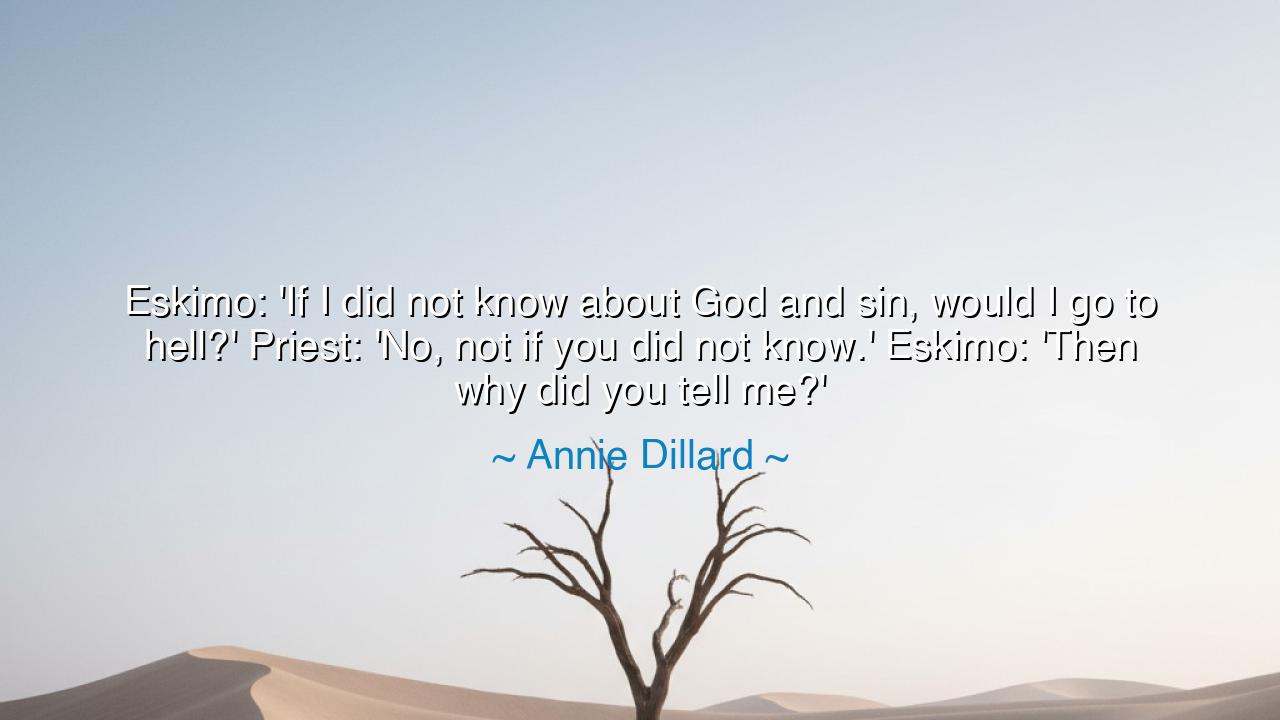
Eskimo: 'If I did not know about God and sin, would I go to
Eskimo: 'If I did not know about God and sin, would I go to hell?' Priest: 'No, not if you did not know.' Eskimo: 'Then why did you tell me?'






Hear the sharp and timeless parable told by Annie Dillard, that poet of nature and truth, who once wrote: “Eskimo: ‘If I did not know about God and sin, would I go to hell?’ Priest: ‘No, not if you did not know.’ Eskimo: ‘Then why did you tell me?’” In this brief exchange lies a world of irony, sorrow, and insight. It is the cry of the innocent confronting the burden of knowledge, the question of a soul caught between ignorance and salvation. Dillard, with the power of simplicity, unveils one of the oldest riddles of faith: if knowledge brings both truth and torment, is enlightenment always a blessing—or can it, at times, be a curse?
The origin of this quote appears in Dillard’s Pilgrim at Tinker Creek, a book that meditates upon creation, faith, and the terrible beauty of existence. The tale of the Eskimo is not meant as mockery, but as revelation. In a few words, it exposes the uneasy tension between religion and innocence, between revelation and responsibility. The Eskimo, unspoiled by doctrine, asks a question that pierces to the heart of theology: if ignorance spares the soul from judgment, then the act of teaching becomes a double-edged sword. The priest, representing institutional faith, becomes both the messenger of salvation and the bearer of condemnation. For in revealing the law, he also reveals guilt; in offering knowledge, he awakens conscience.
This story echoes the ancient tale of Adam and Eve, who walked in the garden without shame until they ate from the Tree of Knowledge. Before that moment, they lived in harmony with creation; afterward, they knew good and evil—and thus, their innocence was lost. The Eskimo’s question carries the same ache: why open the eyes of the soul if sight brings sorrow? Once one knows of sin, one can never again be blameless. Dillard’s wisdom here is not an argument against knowledge, but a lament for the cost of awakening. Every revelation carries a shadow; every truth requires courage to bear.
In this, the Eskimo becomes a symbol of all who stand at the threshold between ignorance and enlightenment. His question is the question of the world itself. For every discovery that mankind has made—from the fire that burned brighter than the sun to the splitting of the atom—has come both blessing and destruction. Knowledge is power, but it is also peril. The priest’s teaching, though born of love, carries the same tragic weight as every human pursuit of truth. It reveals that wisdom demands responsibility, and that once the mind has seen, it cannot unsee.
Consider the story of Galileo, who looked through his telescope and saw the truth that the earth moves around the sun. For this revelation, he was condemned—not because he was wrong, but because his truth shattered the fragile peace of ignorance. Like the priest, Galileo’s discovery forced the world to confront what it did not wish to know. And yet, as with the Eskimo’s tale, knowledge cannot be withheld forever. The universe calls us to awaken, even though awakening wounds. Truth, once spoken, transforms both speaker and listener alike.
But Dillard’s tale also whispers another truth, gentler yet profound: that God is not the author of fear, but of freedom. The priest, perhaps, has forgotten that revelation must be joined with compassion. To teach another about God is not merely to speak of rules and punishments, but to reveal the love that underlies creation—the mercy that redeems even the fallen. The Eskimo’s sorrow arises because the message of salvation was given without the balance of grace. Knowledge of sin without knowledge of mercy is despair; but to know both is to understand the fullness of life, in all its tragedy and redemption.
Thus, the story is a mirror held before all who teach, all who seek, all who speak of truth. Annie Dillard teaches that enlightenment is not something to be forced upon others, but to be offered with humility, as a candle that guides rather than blinds. Every word we speak of truth should lift, not burden. Every revelation should awaken compassion, not guilt. For it is not enough to know—we must also love what we know.
And so, O seeker of wisdom, remember this: truth must always be tempered by tenderness. Do not rush to instruct others in what their hearts are not yet ready to receive. Seek understanding before judgment, mercy before doctrine. For once a soul awakens, it can never return to sleep—and awakening, though divine, can also be painful. Yet take courage, for this is the law of growth: that innocence must yield to knowledge, and knowledge, if guided by love, will lead us home to God again.






AAdministratorAdministrator
Welcome, honored guests. Please leave a comment, we will respond soon